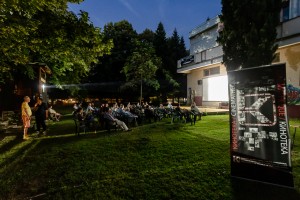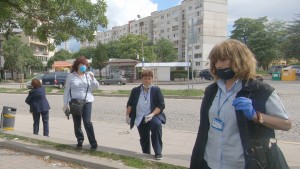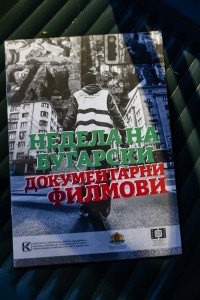 The event took place June 21 to 27 2023 and once more shows the spirit of common work and friendship between the Cinematheque of North Macedonia and the Bulgarian National Film Archive.
The event took place June 21 to 27 2023 and once more shows the spirit of common work and friendship between the Cinematheque of North Macedonia and the Bulgarian National Film Archive.
Documentaries are often undeservedly overshadowed by fiction films, at least in terms of their popularity among the general public. Due to its specific means of expression and inherent educational and informative nature, viewers may find it to be a bit of a bore. Since the dawn of cinema, however, filmmakers who create this type of film have tried to break these clichés and notions. Currently, we are witnessing a period of increased interest in documentary cinema worldwide. Documentary films are winning major awards, the approaches to telling a story are more diverse and creative, and the possibilities for online distribution through legal platforms allow unprecedented access to the works of documentary cinema.
In the last two decades, Bulgarian documentary cinema has reached a good average level of production, as each year over 50-60 films are produced. New and young filmmakers are constantly joining in. The entire toolset of modern cinema and TV documentary production – unknown archival forage, 3D animation, different points of view, reconstructions… The filmmakers have different approaches in terms of constructing a narrative and presenting facts.
Attracting a wider audience, especially in a movie theatre, remains an unsolved problem to this day. That is why it brings me immense pleasure that together with the colleagues from the Cinematheque of North Macedonia we have prepared a representative selection of 10 Bulgarian documentaries. All of them are watchable, interesting, informative, have a fun element, and each is different from the other ones artistically. Another common theme is that all 10 of them had a successful festival presence and a relatively good performance on the domestic market during regular distribution.
The opening of the Week of Bulgarian Documentary Cinema in Skopje kicked off with Guardians of Our Conscience (2021, dir. Stanislav Donchev). To introduce the film, one of its screenwriters, Petya Alexandrova, who is an esteemed film critic in Bulgaria, was a guest at the event. She also presented the book “Bulgarian Post-Totalitarian Documentary Cinema” by Teodora Stoilova-Doncheva, who she co-wrote the script with.
The film sheds light on the little-known, but much-hated profession of conductors in Sofia’s public transport and the so-called “clampers” who penalize drivers for improperly parking their cars in the central areas of the capital. Their work is far from being easy – they have to possess a strong mentality, and at times defend themselves physically – but under the whole professional façade, they are still human beings with a special attitude towards life. For them, madness is an everyday situation – on the streets, at bus stops, at the traffic lights… The film crew is no less brave in reflecting on it.
Next in the week-long event is a program that includes the films “Autumnally” (1982, dir. Pancho Cankov), “I Dream Music” (1983, dir. Boris Hristov), and “Of Men and Bears” (1996, dir. Eldora Traykova).
“Autumnally” is an impressionistic miniature, which in an exceptionally poetic way, without words conveys so much – specifically about life in Bulgaria, but also more generally about human nature.
“I Dream Music” is part of a trend in Bulgarian documentary cinema from the 1980s, which, according to Teodora Stoilova-Doncheva, is preparing Bulgarian society for the change in the political scene that is in the near future. The films in this series are shocking, brave, sincere, and uncompromising, demonstrating a very good professional level and revealing the problems society in socialist Bulgaria is up against. At the same time, the film is an original portrait, filled with magical music and the talented personality of Ivo Papazov-Ibryama – the world-class clarinetist who, I am certain, the audience in North Macedonia knows well.
“Of Men and Bears” is part of another group of films, formed after the changes, but again capturing the pulse of the times. This creative tendency, according to Stoilova-Doncheva, is united by the theme of traveling. These are some of the most important and impactful, most awarded films nationally and internationally in our recent film history and in which traveling, in one way or another, has been made the protagonist of the narrative. These films are among the classic masterpieces of Bulgarian documentary cinema.
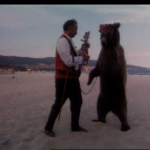 “Of Men and Bears” is a sharply social and critical film that colorfully tells the story of dancing bears and their trainers. It achieved a level of socio-psychological depth that was unprecedented. It also deals with the topic of minorities in Bulgaria, which subsequently transformed from being a taboo subject during socialism into one of the clichés of the post-totalitarian period, to which Bulgarian documentary cinema, along with television journalism, made a major contribution. According to the Bulgarian film critic Genoveva Dimitrova, Eldora Traykova is the only one who managed to go beyond ascertainments and turn her observations on the subject into dystopian pictures of the state.
“Of Men and Bears” is a sharply social and critical film that colorfully tells the story of dancing bears and their trainers. It achieved a level of socio-psychological depth that was unprecedented. It also deals with the topic of minorities in Bulgaria, which subsequently transformed from being a taboo subject during socialism into one of the clichés of the post-totalitarian period, to which Bulgarian documentary cinema, along with television journalism, made a major contribution. According to the Bulgarian film critic Genoveva Dimitrova, Eldora Traykova is the only one who managed to go beyond ascertainments and turn her observations on the subject into dystopian pictures of the state.
The next decade is presented by the film “The Mosquito Problem and Other Stories” (2007, dir. Andrey Paounov) – one of the most awarded Bulgarian films. Society has now settled down from the storms of the 1990s and is ready for an analysis of the consequences of the changes. Andrey Paounov’s second film repeats and builds on the success of its predecessor “Georgi and the Butterflies” from 2004, considered the first significant film in Bulgarian cinema of the 21st century. The distribution policy and the festival strategy of the producers, AGITPROP, in accordance with the unquestionable artistic qualities of the films, spearheaded the new Bulgarian documentary cinema’s entry on the world film map. The team behind the two films – Martichka Bozhilova (producer), Andrey Paounov (director), and Boris Misirkov and Georgi Bogdanov (cinematographers) formed a great collective that created a recognizable style in documentary cinema with characteristic features – artistic vision, unusual look at mundane topics and gentle irony aimed at its subjects, which sometimes teeters dangerously on the edge of mocking them but never seems to cross the line.
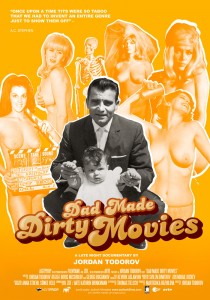 “Dad Made Dirty Movies” (2011, dir. Jordan Todorov) tells the story of the lacking in popularity, but not in ordinariness Stefan Apostolov, who flees abroad to escape the communist regime. In Hollywood he realized the American dream, becoming the producer and director Stephen Apostolof (or A. C. Stephen). The story is told traditionally – with interviews and archival footage, but Todorov purposefully elevated Apostolof’s character into a cult. At the same time, he demonstrated why this is so important – during the time and the genre he worked in, Stephen Apostolof truly had a cult following. The viewer learns about the unknown cinema of sexploitation and the nudie-cutie genres, overpowered by porn.
“Dad Made Dirty Movies” (2011, dir. Jordan Todorov) tells the story of the lacking in popularity, but not in ordinariness Stefan Apostolov, who flees abroad to escape the communist regime. In Hollywood he realized the American dream, becoming the producer and director Stephen Apostolof (or A. C. Stephen). The story is told traditionally – with interviews and archival footage, but Todorov purposefully elevated Apostolof’s character into a cult. At the same time, he demonstrated why this is so important – during the time and the genre he worked in, Stephen Apostolof truly had a cult following. The viewer learns about the unknown cinema of sexploitation and the nudie-cutie genres, overpowered by porn.
Another cosmopolitan Bulgarian is portrayed in the film “Stoichkov” (2012, dir. Borislav Kolev). The most popular Bulgarian, Hristo Stoichkov, is shown during his glorious moments. This approach is justified by the filmmaker, according to whom the elevation of the man behind the name was the main goal. Kolev says about Stoichkov that he is a volcano in which all kinds of passions are raging, and apart from that, he is also a genius. The people who worked on the film have woven this same passion into the fabric of the story, which is why “Stoichkov” is attractive even to those who are not interested in football. It is no coincidence that it is the most watched documentary film in Bulgaria after the changes.
“The Last Black Sea Pirates” (2013, dir. Svetoslav Stoyanov) is simultaneously a funny and a sad collective portrait of a group of hopeless dreamers. Various life circumstances have pushed them to the margins of society, where they search for adventures and treasures.
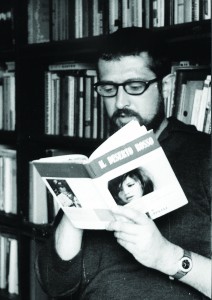 “Citizen Cinema” (2014, dir. Kosta Bikov) portrays in an emotional way another hopeless dreamer – the film historian, director of the Bulgarian National Film Archive (from 1976 to 1981), and teacher, “the star of Bulgarian film criticism”, Todor Andreykov, whose passion for cinema has ignited the cinephile spark in a number of film and non-film people in Bulgaria. Both Andreykov’s personality and the film evoke a touching unification amongst the film community in Bulgaria and are charged with the personal affinity the filmmaker has for Andreykov. At certain times this becomes a weakness of the dramaturgy, but “Citizen Cinema” achieves its main objective – to show Todor Andreykov’s love for the art form of film.
“Citizen Cinema” (2014, dir. Kosta Bikov) portrays in an emotional way another hopeless dreamer – the film historian, director of the Bulgarian National Film Archive (from 1976 to 1981), and teacher, “the star of Bulgarian film criticism”, Todor Andreykov, whose passion for cinema has ignited the cinephile spark in a number of film and non-film people in Bulgaria. Both Andreykov’s personality and the film evoke a touching unification amongst the film community in Bulgaria and are charged with the personal affinity the filmmaker has for Andreykov. At certain times this becomes a weakness of the dramaturgy, but “Citizen Cinema” achieves its main objective – to show Todor Andreykov’s love for the art form of film.
“The Good Postman” (2016, dir. Tonislav Hristov) deals with the unavoidable in its actuality topic of refugees. However, it is only a starting point for deeper summaries of contemporary life. Hristov’s characters, refugees from themselves, live in the desolate village of Golyam Dervent. According to Stoilova-Doncheva, the characteristic of this film, as well as Tonislav Hristov’s other films, is that they are emotionally charged and often told as a tale without distracting from their documentary nature. I would add that they always move on the very fine line between documentary and fiction and in this sense, they are a phenomenon in the Bulgarian film context, but they are absolutely in sync with modern trends worldwide.
During the selection, with the colleagues from the Cinematheque of North Macedonia, we were following another factor – that the films should not be political. By no means does this mean that they are toothless. Each of the titles, regardless of its specific subject matter, represents an accurate picture of society and the complex world we live in, and helps to make sense of them. And this is perhaps the most important feature of good documentary cinema.
Translated by Boyan Tzenev
Pictures:
Bulgarian National Film Archive
Cultural and Information Center of the Republic of Bulgaria in Skopje

